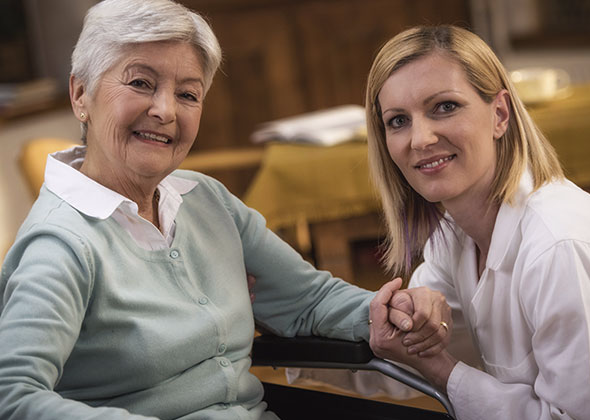|
|
ElderCare at Home brings you this newsletter in the spirit of cooperation and education.We hope you find this information useful and informative.
|
Preparing for the New Season
June ushers in the summer season, which means kids are out of school, the sun is shining bright, and many families use this time to travel. If you are caring for an aging loved one, the summer may not necessarily involve you traveling or doing outdoors activities. But this fact does not mean you and your loved one cannot enjoy the beneficial aspects the summer can bring. In this month's Newsletter, we will share some ways family caregivers can prepare themselves and their loved ones for the summer, as well as participate in what the month of June has to offer.
(1)
Safety First! Summers usually mean some extreme heat. This past decade, the world has seen some of its hottest temperatures on record. Thus, it is important to consider you and your family's safety. In essence, try to reduce you and your loved one's exposure to high temperatures during the summer as it can lead to heat exhaustion or heat stroke. For example, if you want to take your loved one outside, do so in the morning or in the afternoon, when the temperatures are somewhat cooler than they are at noontime, when the sun is high in the sky. Additionally, make sure to apply sunscreen when you go outside to protect against sunburn. Lastly, make sure you and your family remain well-hydrated. Drink at least 64 oz. of water per day, and make sure to always have water on hand when you are outside.
(2)
Encourage the Family to Visit Your Loved One: If you are a family caregiver, chances are you are also juggling other responsibilities like managing a family or caring for a child. If this is the case, then try to encourage your family to visit your loved one, especially if your loved one is cooped up inside the house for most days. For example, the month of June usually means that many kids are off of school. Many aging individuals love to spend time with their grandchildren. If you have a child, try to bring them with you so they can say hello to their grandparent(s). Not only is this a great way to foster a relationship between grandchildren and their grandparents, but it can be a huge emotional and psychological benefit for your loved one, especially if they do not get to interact with people that much.
(3)
Celebrate Father's Day: If you are caring for an aging father, try to prepare something special for them this Father's Day. Whether that means throwing them a party or finding a gift to celebrate their role in your life.
(4) P
lan Wisely for Travels: Traveling with an aging loved one can be somewhat difficult. This difficulty can be compounded if your loved one is living with a degenerative neurological disorder. The important things to remember are to make transitions easy, plan out your travels in careful detail, and make sure you locate necessary health resources at your travel destinations. In essence, try to minimize the stresses of traveling for your loved one by ensuring you can go from point A to point B and then from point B to point C with ease. One of the stresses of traveling can be the often confusing or disorienting parts of it, like at crowded airports. The more you can confidently navigate the various terrains during your travels, the less overwhelmed your loved one is likely to feel.
Above all, we hope that you can enjoy the summer and the fun this season can often bring. Spend time with those you love. Lastly, know that we are here for you!
If you have any questions or want to learn more
then please call 888-285-0093 or visit our
website.
|
ElderCare at Home Voted 2018 Best Alzheimer's Blogs
We've carefully selected these blogs because they're actively working to educate, inspire, and empower their readers with frequent updates and high-quality information.
The Alzheimer's Association estimates that this brain disease affects nearly
6 million people in the United States alone. It can affect anyone at any age, but most people are around 65 years old at onset.
It's been said that when you meet a person with
Alzheimer's or
dementia, you've only met oneperson with Alzheimer's or dementia. That's because symptoms reveal themselves differently in different people. No two people who develop Alzheimer's follow the same path.
But whatever your journey with Alzheimer's or dementia looks like - whether you have it or you know someone who does - you're not alone. Online resources like ElderCare at Home's blog, offer a wealth of knowledge and support.
You can read our blog
here!
|
|
Healing Hearts
A New Program from ElderCare at Home

Cardiac Home Care Services
ElderCare at Home understands the challenges of recovering from or living with a cardio-vascular disorder. Our referred caregivers offer the highest level of comfort and care. They have the training, education and expertise to effectively help patients diagnosed with even the most complex cardiovascular disorders including:
- Arrhythmia
- Cardiac Arrest
- Cardiomyopathy
- Congenital Heart Defect
- COPD
- Congestive Heart Failure
- Heart Valve Problems
- High Cholesterol
- Metabolic Syndrome
- Peripheral Artery Disease
- Post-Surgical Patient
A highly skilled geriatric care consultant or registered nurses (RN) can meet with the patient and help him or her determine which services, if any, would be most appropriate. Home-based
cardiac care services can include:
- Complimentary Pre-Operative Home Care Consultation
- Complimentary Post-Operative Home Care Consultation
- Implementation of Post-Operative Care Plan
- Dressing Changes
- Medication Management
- Nutritious Meal Preparation
- Diet & Nutrition Instruction
- Transportation
- Education & Disease Management
- Maintenance of a Quiet, Comfortable Environment
- 24 Hours Per Day ~ 7 Days Per Week
If you are interested in
learning more about what we can do to help you, please
call (561) 585-0400 or visit our
website.
|
|
Maintaining a Healthy Brain
T a k i n g C a r e o f Y o u r M i n d

Maintaining a Healthy Brain
It is impossible to predict the future. Despite this fact, we can often act in such a way to bring about a desirable outcome in the future. As we age, our bodies change, and, as a result, our experiences of the world also changes. Aging and its effects on our bodies are inevitable, but these changes do not always have to be negative. In this blog, we want to focus on one part of our body and how we can take care of it as we age. We are referring to our brains.
Our brains are the powerhouses of our bodies. An unhealthy brain, means an unhealthy body. Although our brain does function somewhat differently in old age, we should not expect it to decline dramatically. Disease like Alzheimer's are an unnatural part of aging-it should not be happening. Unfortunately, there are often genetic, historical, and other health factors out of our control. However, we can focus on some things that we do have control over to ensure that our brains maintain their health over time.
Leading a healthy lifestyle can mean many different things. We will go over what "living healthily" looks like:
- Getting enough sleep: Perhaps one of the most important things to be aware of is your sleep. Sleeping a good 7 to 9 hours a night helps many other parts of your health fall into place. Good sleep can restore your energy, improve your mood, help you regulate your weight, as well as preserve your mental health. Sleeping less than seven hours a night has been linked to an increase risk of dementia in old age.[1]
- Eating healthy: According to a Harvard Medical School letter, a good diet for your brain is a diet that is also good for your heart and blood vessels.[2] In the letter, they recommend eating fruits, vegetables, whole grains, lean meats (like fish), unsaturated fats (like olive oil), and vitamins and minerals. The best way to ensure you are getting enough vegetables and fruit is to have at least one serving of them with every meal. Try to make your plates colorful, meaning you should have different colored vegetables and fruits so you can get a diverse array of important vitamins.
- Exercise: Depending on your abilities, you should start an exercise routine. To begin, try taking walks around the neighborhood. Incorporate more exercises as you progress over time. A combination of weightlifting and cardio will provide the most benefits. Always consult a doctor before starting any exercise routine.
- Learning: Keep your brain engaged with activities that stimulate your mind, like puzzles, learning new tasks, or reading. There are so many ways to keep your mind engaged, just be creative! Find a mentally stimulating hobby that you love and prioritize it. If you like to paint, set aside time on the weekends to paint. If you like to learn languages, see if your community offers language tables where you can practice with others. Learning may not prevent degenerative neurological disorders, but they are correlated with fewer symptoms in old age.[3]
- Prioritize mental health: Do not let stress overwhelm you. If you are overly stressed, anxious, or depressed, then you should speak with a counselor who can help you find strategies and coping mechanisms to manage difficulties. Additionally, following the above steps can promote better mental health, especially sleeping enough every night.
If you are interested in ElderCare at Home
and learning more about what we can do to help,
call 888-285-0093 or visit our
website.
|
|
Client Testimonials
"When we needed immediate assistance for in-home care for our aunt, I called ElderCare at Home. Fortunately, Eldercare gave us what we needed, when we needed it. A wonderful Caregiver was referred to us and was with us for more than 9 months, and we couldn't ask for more. My aunt enjoyed her company and she was extremely well-cared for. The staff continually checked-in to see if we had issues or required any further help. ElderCare at Home was definitely "The Right Choice".
Mary Stayton
|
Professionally Trained Caregivers
F i n d t h e R i g h t T y p e o f C a r e

Find the Right Caregiver
Get Professional Help for Your Loved One
ElderCare at Home recognizes that finding time to balance all of your responsibilities is a challenge. If you have an aging loved one, then you might feel like you're at wit's end trying to keep everything in order. That is why we are here to help.
Our certified nursing assistants and home health aides are screened to ensure that your loved one is receiving the care they deserve. A component of the care they might receive is help with meal preparation. As we mentioned above, ensuring that your loved one is well-nourished and fed is crucial for their continued care.
The aides we refer to you all have expertise in providing care for seniors who have degenerative neurological disorders. So, they will know the appropriate strategies and techniques to practice during challenging situations.
ElderCare at Home also promises to match you with the caregiver who can meet your or your loved one's needs to the fullest. Visit our webpage and read about our Caregiver Match Guarantee.
If you have questions about how ElderCare can help,
please call us at
888-285-0093 or visit our website
.
|
|
We're More Than Just Private Duty Home Care
Specialty Home Care Programs
 In addition to our Alzheimer's/dementia specific private duty referral services, ElderCare at Home, a licensed nurse registry, has referred caregivers who have provided exceptional care to thousands of patients through a number of specialty home care programs and our vast network of referred, independent contractors. In addition to our Alzheimer's/dementia specific private duty referral services, ElderCare at Home, a licensed nurse registry, has referred caregivers who have provided exceptional care to thousands of patients through a number of specialty home care programs and our vast network of referred, independent contractors.
Each referral program allows the patient to recuperate in the place they most want to be... their own home! Most patients experience positive outcomes and are able to enjoy an improved quality of life.
ElderCare at Home is always here for you!
To learn more, reach out to us at anytime (561) 585-0400.
|
Client Referral Program
A Promotional Offer From ElderCare at Home
ElderCare at Home would like to thank you!
As you know, our mission is to help seniors live confidently and age gracefully at home for as long as possible. We are continually working to educate the community about the services that we provide. However, it is often difficult to get this information to everyone.
ElderCare at Home would like to ask for your help in this endeavor. If you know of anyone who could benefit from our services, simply give them one of our Client Referral Program flyers with your name written on it and prompt them to schedule a FREE assessment. If they retain our services, we will give each of you 15% off a week's worth of services*!
Thank you so much for your help! We really appreciate it.
|
Making Time for Self-Care
An Ar
ticle from the ElderCare at Home Blog

eing a family caregiver is a fulltime job. In reality, many people who are family caregivers are already balancing a lot, like other fulltime jobs, a family, managing a household, etc. One of the things that become neglected while trying to balance all these responsibilities is self-care. Truthfully, it is very difficult to devote time to yourself when your schedule is already so busy. But caregivers should still take a moment to think if there is any possible way to set some time aside for their health. In this blog, we want to share some ways you can make time for self-care in your own life. [. . .]
For more information regarding Alzheimer's
|
|
Caregiver Support Groups
Open Support Groups for Family Caregivers
Caring for someone that has Alzheimer's disease, dementia or other cognitive impairment is hard. These support groups are attended by caregivers who are struggling with all kinds of different challenges and emotions.
ElderCare at Home in cooperation with the Alzheimer's Care Resource Center, facilitates more than 17 Caregiver Support Groups throughout the Palm Beach County area.
Our Alzheimer's caregiver support groups are different! Our caregivers are able to come together and share in a warm, relaxed and nurturing environment.
We also offer a monthly telephone support group for all Alzheimer's caregivers who are either unable to attend in person, or live out of state.
Call (561) 588-4545 to RSVP
for any of the support groups listed.
|
|
Career Opportunities
Accepting New CNA and HHA Registrations
 We are currently recruiting independent contractors who not
only enjoy working with the memory impaired, but who have an interest in making a difference in the lives of the patients and families they serve. We are currently recruiting independent contractors who not
only enjoy working with the memory impaired, but who have an interest in making a difference in the lives of the patients and families they serve.
Do you have these qualities?
- Experience
- Compassion
- Loyalty
- Commitment
- Kindness
- Professionalism
Referral opportunities are available throughout South Florida.We've been helping
caregivers like you
find employment for over 17 years. As an Independent Contractor, you tell us exactly where you want to
work; how many hours you can devote to your clients; and the type of caregiving situations you are looking for!
Call us Today (561) 585-0400 or Apply Online
|
|
The Best Compliment
Refer Your Friends and Family
The best compliment you can give us is the referral of your friends and family! We always appreciate referrals from our satisfied clients to friends and family members or professional resources. To send us a referral, simply call (561) 585-0400. Thank you! We welcome the opportunity to serve the people you care about. |
|
| |
|